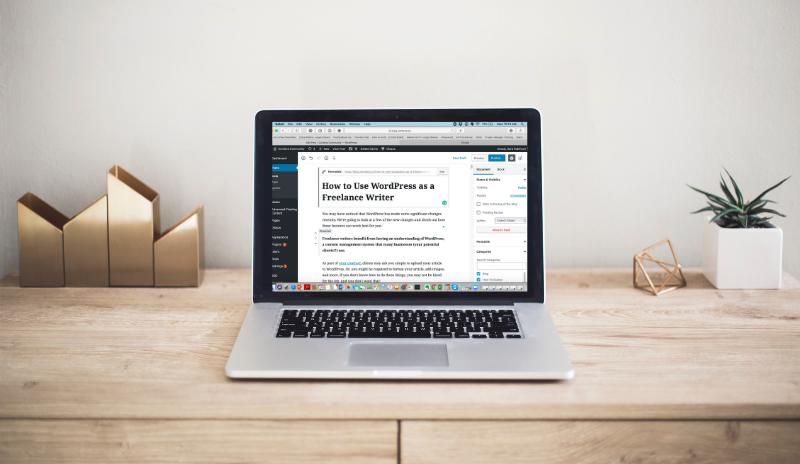To freelance or not to freelance, that is the question.
While you might assume we’d quickly say “Freelance. Yes- you should ditch your job (or work toward that goal) and work as a freelancer!” Well…that might not be right for everyone.
While your full-time job may feel like something that sucks the life out of you, there are plenty of very happy full-time employees. Similarly, there are probably unhappy freelancers (though we don’t want you to be one of those!).
It’s not as cut and dry as one is better than the other, so if you’re in a position where you’re trying to decide which route to go, we wanted to help you consider your options (and no, we won’t be telling you what to do).
Remember that your situation is unique: the industry you work in, your preferred lifestyle, the geographical area and cost of living, and if you have to support others with your income.
If you would prefer to work as a freelancer, but your benefits are too amazing to give up, then perhaps the shift away from your job doesn’t make sense. But if your full-time job barely covers your bills and you have expertise that would allow you to write in a well-paying niche, then perhaps focusing on building your freelancing career and ditching the traditional job makes sense.
Or, maybe you’re a freelancer feeling like you want to end the cycle of ups and downs with clients and not being sure what your monthly income will be.
No one will judge you if you move from freelancing to a full-time (or part-time) job. You might even be able to find a contract position where you’re writing, but you have regular assignments each week. Going “full-time” doesn’t mean you change what you do, but it might instead change how you do your work.
Though your situation is unique and you know it best, hopefully, we can help you find some clarity about which general direction is right for you!
The Full-Time Job:
When I say “full-time job” I mean one that’s 30-hours a week or more. Basically, you’ve hit the threshold for where you’ve started to receive benefits for the time you work each week. Generally, over 30-hours is considered full-time, and 40-hours is the “traditional” hours for full-time, but many jobs will go over that mark.
Freelancing is amazing, but it may not be right for everyone, and there are many reasons why a full-time job is a good choice. Let’s break it down:
Should I have a full-time job?
Pros of a full-time job:
- A consistent income, and ideally a decent one.
- Probably some benefits, like health care, dental, vision, and paid time off…maybe even a flex spending account. Some of the jobs I’ve seen listed on Contena that are full-time even have some sweet perks like paying for your gym membership, travel to company retreats, and funding for equipment like a new laptop! (Keep in mind that you may be eligible for some of the perks if you take a part-time contracted position).
- The company you work for likely provides a community of individuals to be around, and hopefully a positive atmosphere for you to work in.
- You work with other people, in person or remotely who can support you in your role and may help you solve challenges or inspire you when needed.
- Consistency with your work and your paycheck. When you have a full-time job, you can often predict the hours and the tasks that you’re going to be responsible for.
- There might be room to grow. If you’re hired by a company, there might be roles you can be promoted to or moves within the company as your career evolves.
Cons of a full-time job:
- Possibly less flexibility (for example, your job may be a “butt in seat” from 8:30 to 5:30 kind of place).
- At least 30 hours of your week will be taken up by work; possibly a lot more depending on your role and industry.
- You may have a long commute if you don’t work remotely.
- You don’t always like the people you work with and you’re stuck in an office with them.
- Back to consistency: your job may be predictable and if you don’t like your work, doing the same sort of tasks full-time can be soul-sucking.
- You don’t have the time to pursue other interests and passions (but you can definitely balance freelance writing with a full-time job, so this is only a small con).
Depending on your work experience, there may be additional pros and cons on your own personal list. As you can see, there are a lot of fantastic benefits from having a full-time job, and a few drawbacks.
What about freelancing?
When you work as a freelancer, you’re not permanently employed by any one company. You might have a long-term contract, but freelancers are typically working with different employers at any given time and may have a variety of tasks that they can be hired for.
Obviously, we think freelancing is great, but we also don’t want people to go into it blindly, or too quickly.
Should I Be a Freelancer?
Pros of freelancing:
- You’re mostly in charge; you can decide if you take a job or not, and you can often decide when and how you complete your work, as long as you hit the deadlines and meet expectations.
- You’re also mostly in charge of your schedule. Generally, as a freelancer, it won’t matter if you work before the sun rises, after the sun sets, or any time in between. As long as you meet your deadlines. I can’t stress that deadline part enough.
- You can work from anywhere, and there probably isn’t a commute. I put fuel in my car every three weeks now as compared to my husband’s weekly fill-up to get him to and from work every day.
- The freelancer lifestyle is pretty awesome, whether you’re fitting in vacations, doing yoga in the middle of your day, or you don’t start until noon when your brain is fully ready to work. As a freelancer, you can create the work environment that works for you.
- There is often a variety of work. Though I have a freelancer friend who has written hundreds of articles in a very narrow niche for one company, she also writes parenting posts and writes in the mental health space. Even if you write in one niche, you can be hired by different companies.
Cons of freelancing:
- You have your own business, but you’re not totally in charge. When you take a job, you’re working for someone else and are responsible for completing your work. You might excel at writing but if you’re not skilled in organization and business management, you might struggle (don’t panic- you can develop these skills).
- If you don’t work, you don’t get paid so there can be inconsistency between paychecks. As a freelancer, there can be an up and down nature of the work. Some times are busy and others are SO SLOW. And, depending on payment terms, you might have a busy month but not see that money for a while.
- If you’re not self-motivated and organized, you might struggle with the freedom that comes from being a freelancer.
- There are no sick days when you’re a freelancer. Well, you’ll get sick, but you won’t get paid, and you might get behind. There are also no paid vacations and typically no other traditional benefits (unless you end up with a contract).
- It can be lonely as a freelancer. Sometimes it’s nice not having to see or deal with other people, but then, you’re also on your own a lot. That can be tough.
- There’s no one helping you keep your hours so you may work a lot, or not enough. You’ll probably get better at managing your time as you work more as a freelancer, but there can be extremes.
Woah- that list of cons for freelancing seems long. But, a few of the items have to do with personality traits that you might have to look at to determine if freelancing is right for you. And, the other cons (in my opinion anyway) are far overpowered by the “Pros” list.
So here’s the thing- we can’t tell you which is better for you. We can tell you that we know a lot of really happy freelancers and many who are able to make more as a freelancer than they did in a full-time job (myself included- it shocks me sometimes).
If you’re considering a job change, in one direction or another, consider these final thoughts:
- Take the time to consider your options as related to your personal circumstances.
- Decide what the ideal working situation is for you.
- Come up with a plan for how to get there, and though you may have to make a change before you’re fully ready. Try your best to get your ducks in a row before you make a change.
- Fear isn’t a reason to stop yourself. Change is uncomfortable but can be so worth it.










